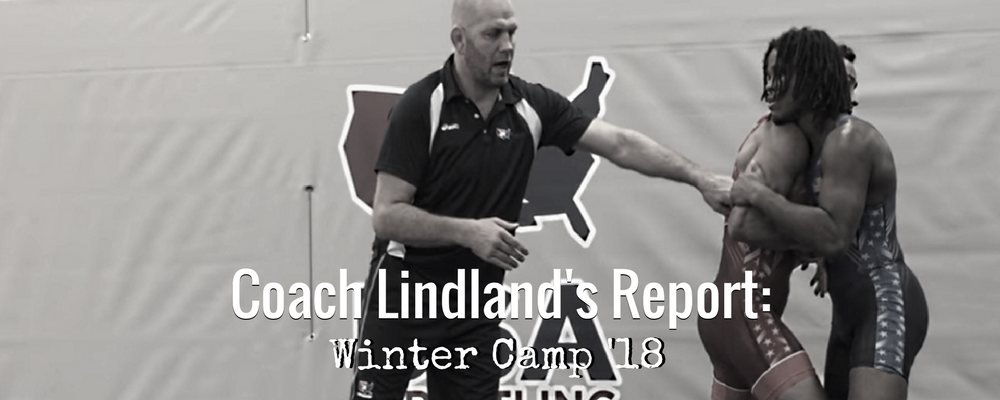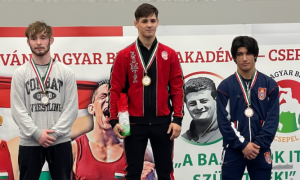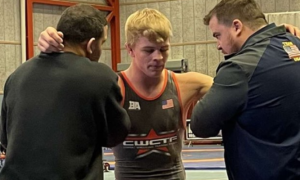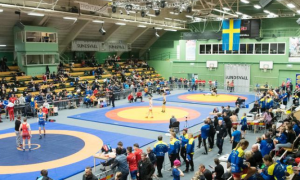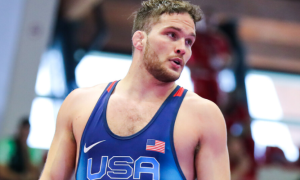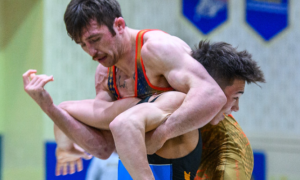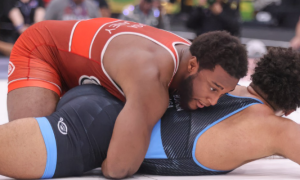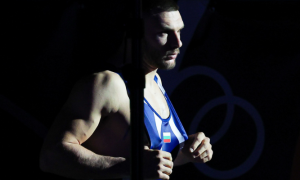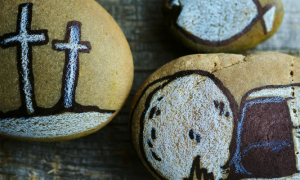Five Point Move is proud to host USA Greco-Roman National Team head coach Matt Lindland each week for Coach Lindland’s Report. Here is where you will find detailed perspectives from Coach Lindland regarding results, training, upcoming events, and other Greco-related news that isn’t available anywhere else. ALSO — if you would like to donate directly to the US Greco-Roman program, just click here. Your support is appreciated!
The first Coach Lindland’s Report of 2018 covers three important topics — the current “Winter Base Training Camp” that is taking place via satellite among the Senior athletes, why Greco-Roman has different World Team procedures compared to freestyle’s more high-profile setup, and of course, Coach Lindland’s perspective on the six Greco World Team coaches who have been selected.
5PM: We’re two weeks into January and the Winter Base Training Camp for Seniors has begun. Are there measurables? For prep camps, you observe heart-rate monitors and chart progress. For this camp, which takes place throughout the country via satellite, do you receive reports from athletes and coaches on the strength training program and their progress?
Coach Matt Lindland: It would be nice. I do get feedback from the athletes and the coaches directly. The guys who are out here in Colorado have done testing before, so we can measure their progress afterwards. We shared that information and the general plan of what we want everyone doing as far as building their base and getting a good, solid foundation underneath them. Any time you’re trying to build any kind of program or building yourself, with the metrics you’re talking about using, you definitely want to have a solid foundation. So, what we did here in Colorado was measure what our strengths were — how much we can bench, how much we can deadlift, and so on. One of the things was a one-arm shot put, seeing how much you can generate just with the upper body.
I’m looking forward to seeing where we’ve made huge gains and sharing that with everybody on the team throughout the camp. The Army guys have their own strength program that their doing and they are still getting on the mat a couple times a week, which is fine. We’re doing one circuit on the mat here at the (Olympic) Training Center. Everybody can put their own twist on it, but we definitely sent out a plan and talked about what the goals were, and we are going to be able to see who has been putting the proper work and time. It’s about rest and recovery in the sense that in order to get the most benefit out of this you have to recover. But — we’re not taking a break. This is very much about high volume and high intensity, we’re just not on the mat. I feel keeping guys off the mat will keep them hungry to get back on it and it will be perfect timing for us to head to Boise to start training with the Serbian team and head overseas.
So I’m really excited about this year’s plan. It’s something we’ve never done before since I’ve been here. This isn’t how I approach things as an athlete. I wasn’t a big proponent of the weight room, but I do see the benefits, especially when you know you need the athletes strong, you need them healthy, and you need them really injury-free. Over the last couple of years, we’ve had several of our elite performers out due to injuries. We’re hoping we can solve that riddle by getting these guys really strong and then after Trials, revisiting that strength plan.
5PM: When you put together this plan, how did you relate the exercises and their goals to the positional influences that obviously play themselves out in the sport itself? If I remember, you were talking about how a goal is for the US wrestlers to be able to lift opponents from par terre and so on. You know what I mean?
ML: I know exactly what you mean. We took motions that we are going to need in wrestling. When you break down a deadlift, what’s the first part? You pull. What’s the first part of lifting a guy off the mat? Straight arms, head up, back straight, and you pull, pull the guy off the mat. And then you still have to do the deep squat. For example, today we did high pulls and got under the bar with a nice squat so you still have to use that lift. Every action in Greco-Roman requires lift. Whether you’re taking someone’s feet off the mat or you’re lifting them from par terre — which is literally the term we use, lift — but even on the feet, whether it is a headlock or an arm throw, it all starts with lift. Of course, bodylocks, you don’t just pop your hips, you pull and create lift in your motion, which will help when you pop your hips because now you’ve got the guy off the mat. There are also sled pushes, and we’re doing some really unique, fun stuff with the big tires.
There are some really great circuits Mohamed (Abdelfatah) has included with this stuff, as well. It’s really a big collaboration. We brought Gary (Mayabb) in, we have the sports science staff from the USOC, the knowledge that Morgan (Flaherty) has brought to the plan, Momir (Petković), and it was all of us sharing our thoughts, getting in a room, and breaking stuff down. Then it was consulting with individuals like Charles Poliquin, who is one the country’s big strength and conditioning guys, and asking questions like, What if we did THIS and how does THIS affect THAT? You’d be surprised, people have different opinions (laughs). You talk to one guy and he says, You have to keep your heart-rate at this variable over X amount of time; you want to stay in a certain heart-rate zone and that will strengthen your base. And then you talk to someone else who is a strength and conditioning guy, and he says, This is an anaerobic sport, you never do long, sustained training like that. You ask different people different things and you’re going to get totally conflicting opinions. Within that, you have to figure out what you’re going to do and you make your best judgement with all of the information you have, and you start to construct a plan.
But essentially, we have broken down all of the movements. We need to drive with our legs, so we have to build strong legs, hips, and butts. We have to be explosive with our pulls, so we’re doing a lot of pulling motions and explosive motions. We don’t need slow, sustained strength; we need really high volume, high intensity, explosive movements. A lot of what we’re doing is focusing on recovery. If we do heavy lifts, then we’re in the ice baths, the sauna, and we’re stretching and getting massages. There are a lot of recovery modalities out there, there is a lot of research out there showing how important recovery is. And it’s just as important as the training to get yourself in peak condition.
Incorporating all of those components is what we’re trying to do and we have a very intense plan. There is also a lot of room for athletes to individualize it themselves, which is what we’re all about, fixing your needs. If you have a weakness, we want to figure out how to strengthen that area and it might be different than someone else in our program. Everyone is going to have a little bit of a different plan and there are going to be adjustments. Some guys don’t pick bars up off the ground, they raise them on boxes because they are healing something up still and trying to strengthen it. We’re not going to put someone in a situation where they are going to injure themselves worse. Although, we did see one of our athletes, Nick (Boykin), strain a muscle in the weight room since we’ve been doing this program, but he’s a young guy who doesn’t have a lot of experience doing this lifting and he probably tried to do too much weight and lost his form. But luckily, it’s just a minor strain and we’ll get him back in there after healing him up a little bit.
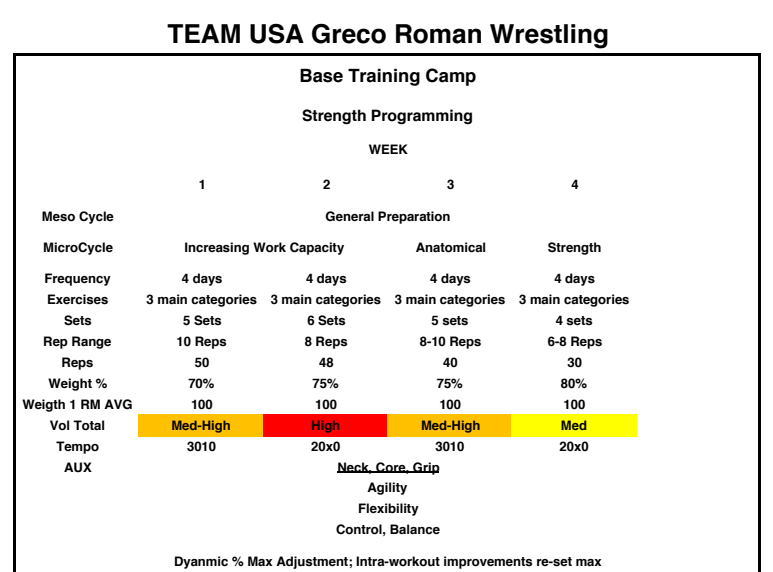
The general outline for the current USA Greco-Roman “Winter Base Training Camp” Senior athletes are participating in. (Image courtesy: Matt Lindland)
5PM: You mentioned feedback from outside of the OTC. What is some of the feedback you received from athletes who traditionally might have been out there this time of year for a camp?
ML: You know, I think everyone kind of understands that the Worlds are in October. We’re not in a rush to make sure we have a January camp. Really, all we did was push the camp back. Besides the Boise camp, we’re going to host an upper-weight camp here in Colorado Springs. Mohamed and Dremiel Byers are going to run that camp. So we are doing the wrestling training, it just got pushed back a month because the Worlds got pushed back so far.
I mean, I think the guys are looking forward to coming out and working together. They are teammates, they want to work together, they want to train together, they want to socialize together — whatever — they want to be together as a team, but due to the timing of the Worlds this year, we’re just not doing it in January. Trust me, the guys who are going to be on the team are going to get plenty of time together throughout the year. We have a great plan moving forward. We are taking three separate tours in February. We’ve got guys going to Zagreb, and this is really due to timing. Armed Forces athletes have that event going on February, as well, so they’re going to Zagreb early. Or, they are taking a shorter tour to Cuba if they’re in the Army program. The guys who have the luxury of spending more time overseas are going to get in a nice camp with all of the Nordic countries as well as Germany. That’s one where we are pretty familiar with that event (Thor Masters), we enjoy that event. We have big delegations and I know you’re going to get those delegation lists out. But we have guys going overseas, and we have two camps going on in February instead of one in January.
The feedback I’m getting is not saying, Hey, what happened to January camp? It’s, When can we get together and train again? What’s the schedule? Everyone has that now, they’ve got the plan in place, and I think we’re moving forward and moving in the right direction, for sure.
5PM: It is halfway through January now, which means we are halfway through your self-imposed exile from social media. How have you enjoyed your time away so far?
Coach Matt Lindland: Well, I’ve been gone from everything, though I did keep YouTube, so I don’t know if that counts as social media.
5PM: I wouldn’t count it, it’s more of a direct content provider.
ML: Okay, so the only thing I’ve been on is YouTube. I’ve gotten off Facebook, Twitter, and Instagram. Honestly, what I think I enjoy most about it is that I get calls from people telling me, Hey, did you see this? Then I have to remind them, No, I’m not on social media for the month, I am taking a break. It’s a cleansing of my soul of some sort. I don’t know if I am going to go back or not, or if I am going to go back to a simple status where I actually have to go online to find it if it’s not on my phone. I don’t know. I’m definitely feeling a lot less cortisol levels in my body in general, and that’s a good thing.
I’m even looking into one of these lights you wake up to instead of an alarm so I can turn my phone off at night and not use it as my alarm clock. A lot of studies are saying that the fact the phone is in your room and you know it could ring, or receive a text or email, it raises your stress hormones. I’m all about staying more relaxed, more present, and in the moment. I think that’s what getting off of social media has allowed me to do, is just to be more present, especially when I’m talking to people. No alerts are going off, no dinging bells. I should figure out to turn off my text alerts, too. I get them, I get texts, I’m not going to go that far; but the frequent dinging, I don’t like that. But I think it has been great. It has been 16 days now and I don’t think I’m missing out on anything. I’m pretty happy, but thanks for asking.
5PM: World Team Trials procedures are known now, Greco’s schedule hasn’t been a secret, but the partnership between USA Wrestling and FLO Sports regarding their Final X Series for men and women’s freestyle was announced today. So naturally, a lot of people are seemingly irate, basically asking “Why not Greco? What’s going on here, this isn’t fair….”
ML: Okay, I think that is a really fair question to ask and it’s not like we were excluded from this. We had put a plan together months and months before this was discussed. Freestyle was talking about doing a pro league and I don’t want to necessarily get into the logistics of why that didn’t work. That is somebody else’s story, why their pro league didn’t go off and why it didn’t work. But within that concept of doing their pro league, they are basically doing what we did in 2015. They are getting their Teams down to their top two athletes earlier in the year and they are going to put on a show for their event. And I think it’s great for the promotion of their sport and the marketing of the athletes. Your sport is only as good as your athletes, and you need to promote your athletes. I agree with all of those things 100%, and that is why I went to this format two years ago back in ’15. I felt that was an important, valuable piece.
But I also feel that we have to grow Greco-Roman and our depth. We don’t have the current stars that the freestyle team has. They have (Kyle) Snyder, they have (Jordan) Burroughs, they have those guys. I would put J’Den Cox into that mix. And now with ten weight classes and the folkstyle notoriety, they have guys like David Taylor and Kyle Dake, who are guys fans know and want to watch. I think it’s incredible for our sport.
Why isn’t Greco-Roman doing this? A), because I put a plan together knowing that was going to take place and saying, Well, they’re going to be done with their top two guys and there is going to be another five athletes who are done with those Trials, and then we’re going to have to tell them they can’t wrestle Greco-Roman. I think just the fact you hear people say, Oh, I would do that if I just had the opportunity, and If I knew about it. Because they did try that in 2014. Before I was putting procedures together, that was tried. But I don’t think it was a big enough window. Two weeks later they had their Trials. We had JD Bergman, we had Sam Hazewinkel come over, and I think it was Enock Francois, and he stuck around on the Greco side. The other two athletes have since retired, they were done before the end of the quad if I remember.
But I think there are some guys out there who are going to have to look and say, Hey, we’re going down to six weight classes. Instead of finding my way in that weight, maybe I find myself in a different style. We’re really trying to find a way to create more opportunities for guys to find their way into our program, to give freestyle athletes an opportunity to come out and try Greco and experience it. If they are good enough to make the top-seven in freestyle at their Open, then they are good enough to try and make a Team if that is their desire to do. We’ve heard a lot of guys say that they would try that, so we’re going to give them a chance to do so.
You were aware that we had a chance to work with the freestyle athletes here at a couple of camps that Bill (Zadick) has had. We worked some tie-up stuff, clearing underhooks, clearing two-on-ones, and just talking about how to go into pressure instead of moving away from pressure, like you see some freestyle athletes do. They move away because they’re not standing up so straight, and they can bend over and stop their opponents from pushing them out. We also worked a lot of par terre, guts, offense and defense. Plus, we got to know these guys and talk to them throughout these camps and make them aware that they will have an opportunity to wrestle in our Trials if they aren’t one of the top two athletes.
I think it is going to be a real positive thing for us. We don’t need to select our Team that early. I think June 21st and 22nd aren’t too late. And I think Greco has kind of our identity. Flo is going to cover our event just like they’re covering these other events. Instead of a three-part series, it is going to be a two-day event. So I don’t know, I think it’s a real positive. And if this format works out great for freestyle and we start building more depth within our program, and we want to hold our Trials at the same time, I always think we can go back to that. This isn’t the way we’re doing it forever. This is the way we’re doing it this year because we have that opportunity.
5PM: The six Greco World Team coaches are in. Four of the six have experienced being on a staff at one point or another. We might know these guys, but what do you like about their selections?
Coach Matt Lindland: If you look, I think what you said is exactly right. We have some experienced guys who have coached teams and some guys who haven’t. And if you look at the last couple of years, that’s what we’ve had going up. (Zac) Dominguez has done Juniors and Cadets, he’s done both teams. He has been the lead on one and Lucas (Steldt) was the new coach last year on a World Team. Now Lucas is kind of the lead coach on another Team. I’m not naming them head coaches or co-coaches, but as you can see, we’re trying to bring more coaches into the pool and get more guys involved. You’re going to actually see a lot more trips going overseas and I know we’re going to be talking more about that in the near future. One weekend, I think potentially we are going to have over a hundred US athletes competing internationally. Coincidentally, I think that’s the same weekend they’re on spring break, so they have the opportunity to travel and we’re very thankful that they are choosing to take their spring break it into their Greco-Roman international training and competition.
We had 64 people who wanted to help Greco-Roman this year and be involved in moving the program forward. But I had to select the guys who have already shown me, without being asked, that they are doing whatever they can to move the program forward. Those guys are the guys who have been selected this year. And we’re going to see even more guys because Gary is on board now and he has been involved in helping us with the developmental programs, putting these programs in place, and creating more opportunities. We get to see who wants to be involved, because now, they are going to have to create more opportunities, like put teams together and take them overseas. We want to see coaches who are involved in clubs and are constantly, consistently coaching Greco-Roman on a daily, weekly, yearly basis. This isn’t a part-time thing for them, their focus is on Greco-Roman and we have those types of coaches working with our athletes. But we also want to see guys who are creating opportunities to do camps and bringing in athletes who maybe aren’t in their clubs. We want to see guys do what Zac did this year, host a Greco-Roman tournament. We want to see guys do more of that. And certainly, we want to see them do what Lucas and Mark Halvorson have done, which is host international events and get athletes overseas to take them on tours, multiple tours.
I think we have the right guys in place, and there are a lot of coaches who didn’t get assignments this year. All of those guys will get opportunities to be involved, and I’m looking forward to working with all of them. We have some incredible men in our sport with great minds. If we can keep growing our sport and increasing what we’re doing, then there will be opportunities for all of those guys to get assignments in the future. But right now, those guys (the six selected coaches) are kind of the guys who have helped move Greco-Roman forward the most over the last couple of years, so we want to continue to keep them involved and give them those premier assignments.
Be sure to follow Coach Matt Lindland on Facebook, Twitter, and his official blog for updates on the US Greco-Roman Wrestling program.
SUBSCRIBE TO THE FIVE POINT MOVE PODCAST
iTunes | Stitcher | Spreaker | Google Play Music | RSS

Notice: Trying to get property 'term_id' of non-object in /home/fivepointwp/webapps/fivepointwp/wp-content/themes/flex-mag/functions.php on line 999

